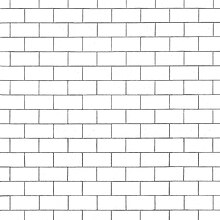The Wall
| The Wall | ||||
|---|---|---|---|---|
 |
||||
| Studio album by Pink Floyd | ||||
| Released | 30 November 1979 | |||
| Recorded | December 1978 – November 1979 | |||
| Studio |
|
|||
| Genre | ||||
| Length | 80:54 | |||
| Label | ||||
| Producer | ||||
| Pink Floyd chronology | ||||
|
||||
| Immersion box set cover | ||||

2012 Immersion box set cover
|
||||
| Singles from The Wall | ||||
|
||||
| Professional ratings | |
|---|---|
| Review scores | |
| Source | Rating |
| AllMusic | |
| The Daily Telegraph | |
| The Great Rock Discography | 9/10 |
| MusicHound | 5/5 |
| The Rolling Stone Album Guide | |
| Smash Hits | 8/10 |
| Sputnikmusic | 5/5 |
| The Village Voice | B− |
| Virgin Encyclopedia of Popular Music | |
The Wall is the eleventh studio album by the English rock band Pink Floyd, released as a double album on 30 November 1979 by Harvest Records in the United Kingdom and by Columbia Records in the United States. Considered one of the most famous concept albums by any artist,The Wall features the band's only single to top various charts, "Another Brick in the Wall, Part 2", followed with "Run Like Hell" and "Comfortably Numb". In 1982, the album was adapted into a feature film: Pink Floyd – The Wall.
The story, which explores themes of abandonment and personal isolation, follows Pink, a character whom bass guitarist and lyricist Roger Waters modeled after himself and the band's original leader, Syd Barrett. Pink's life begins with the loss of his father during the Second World War and continues with abuse from his schoolteachers, an overprotective mother, and the breakdown of his marriage; all contribute to his eventual self-imposed isolation from society, represented by a metaphorical wall..
Waters conceived The Wall during Pink Floyd's 1977 In the Flesh Tour, when his frustration with the audience became so acute that he spat on them. After presenting the rest of the band with ideas for two rock operas, they voted in favour of The Wall. Recording lasted from December 1978 to November 1979 while the band struggled with various personal and financial difficulties. Keyboardist Richard Wright was unceremoniously fired from the band by Waters during its production but remained as a salaried musician, performing with Pink Floyd during the subsequent tour. The performances, which were later released as a live album, featured elaborate theatrical effects. Some of the album's themes would be continued in the band's next album, The Final Cut (1983), which contained some outtakes from The Wall.
...
Wikipedia
